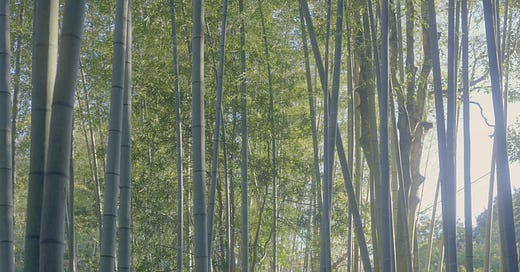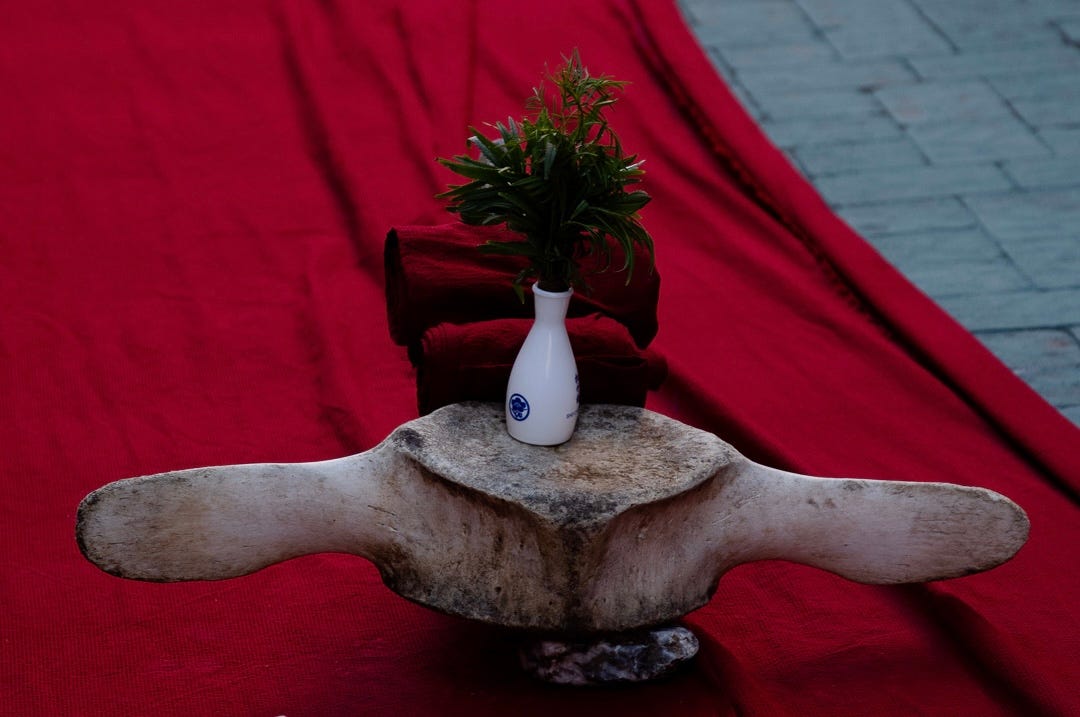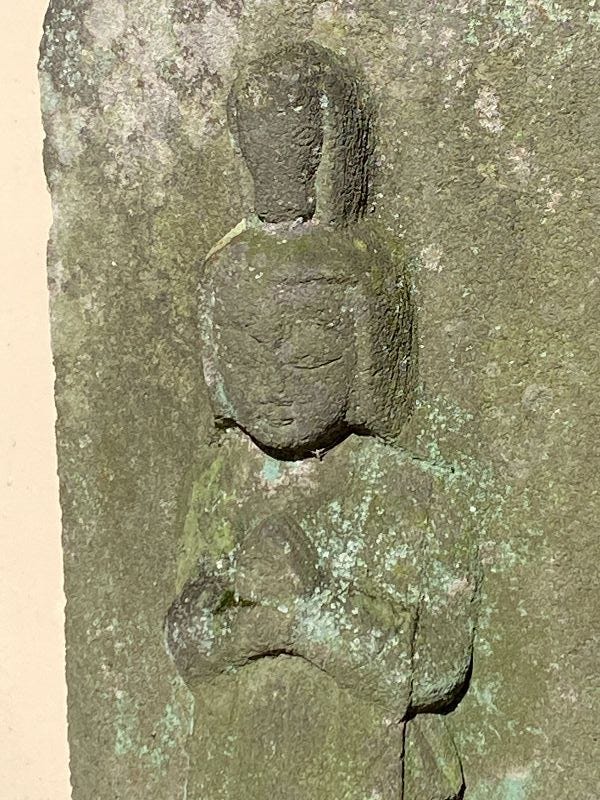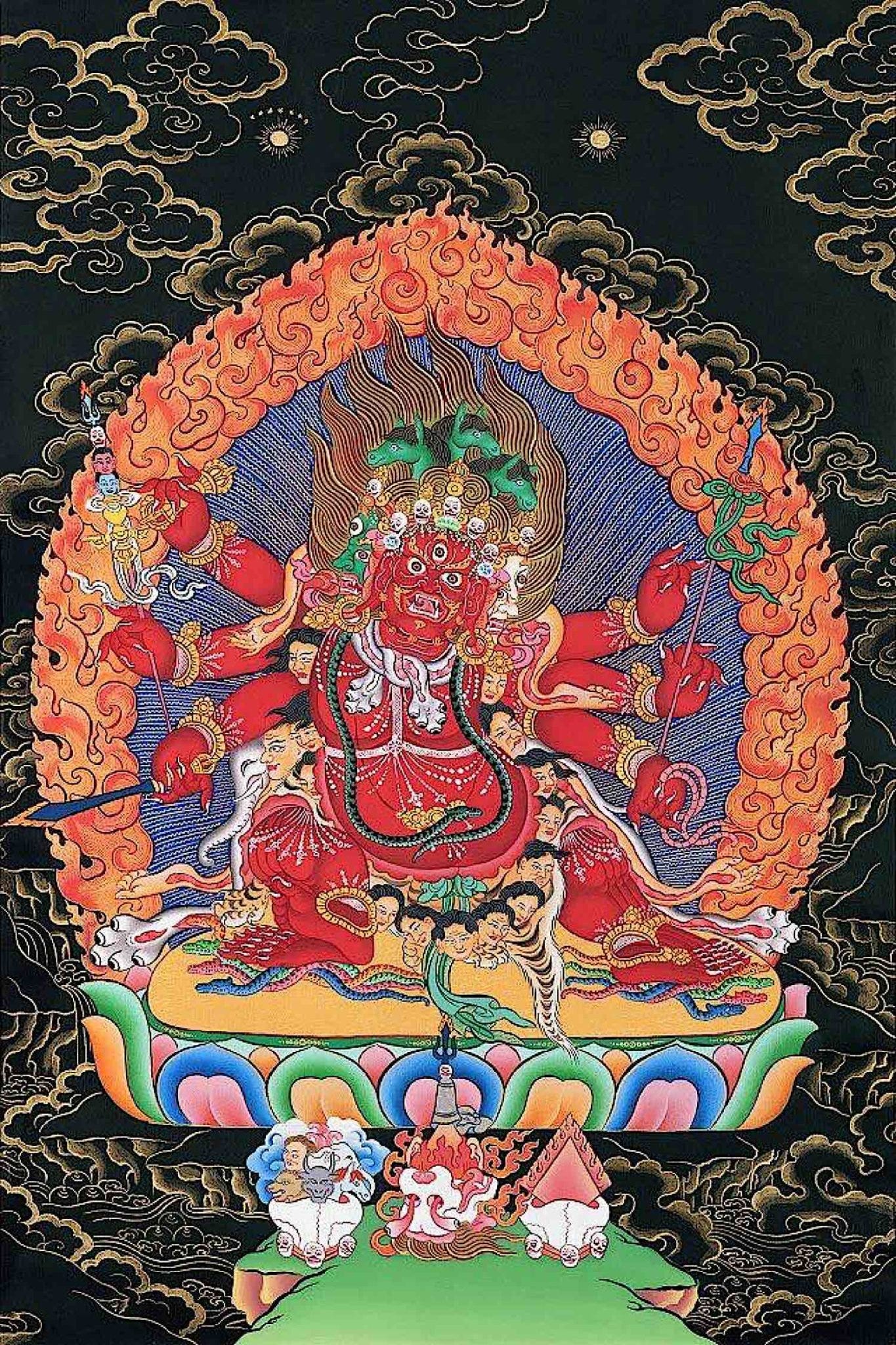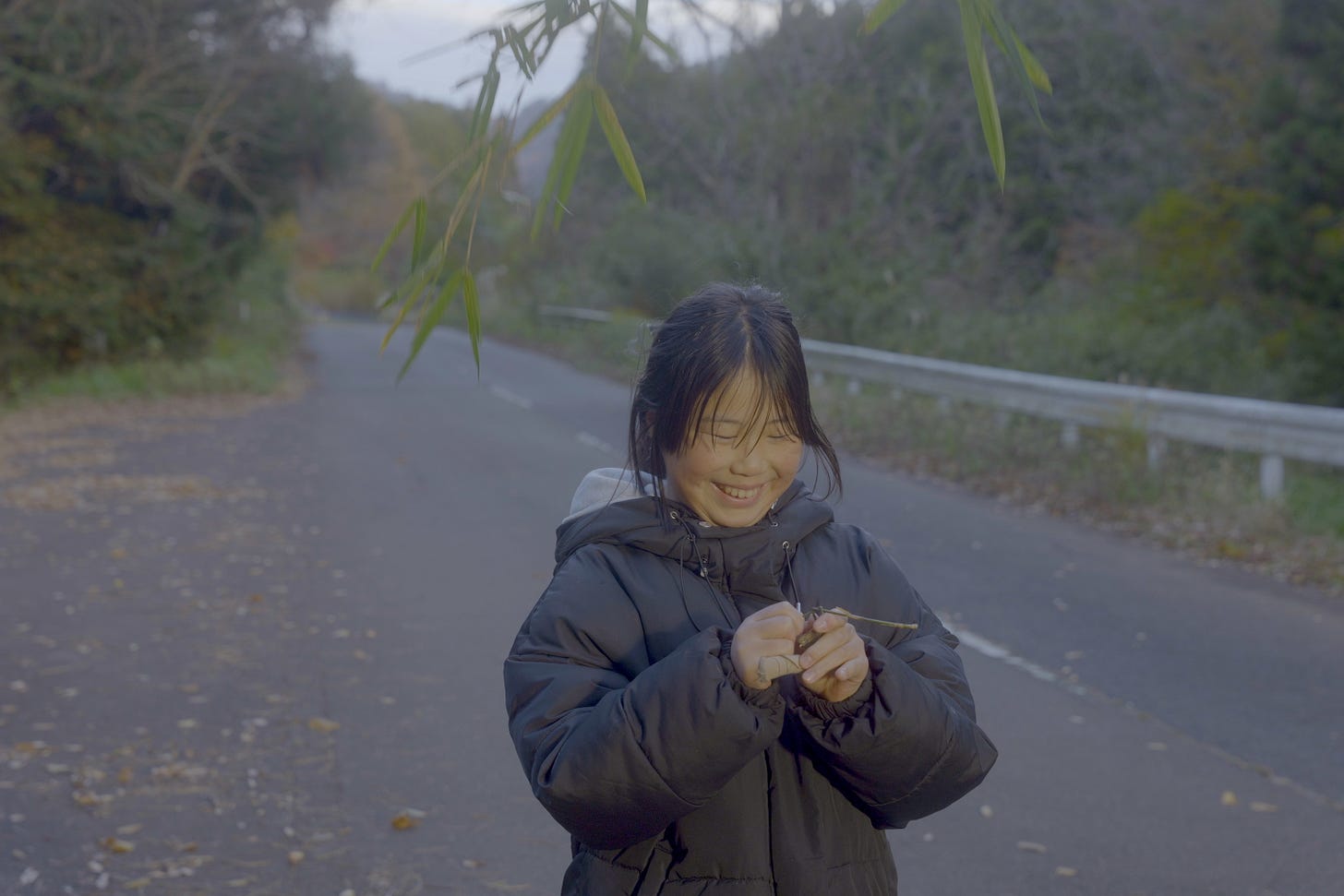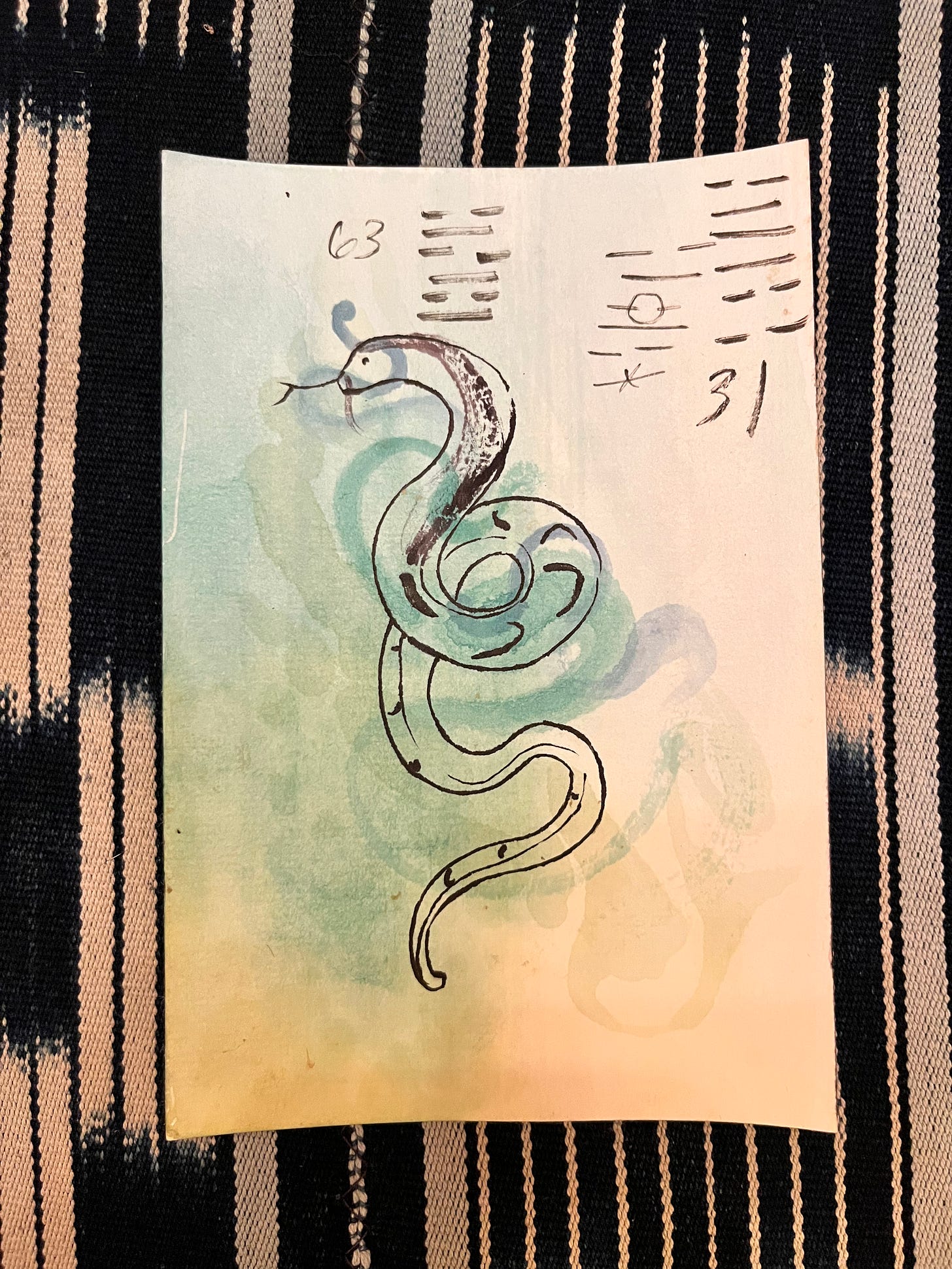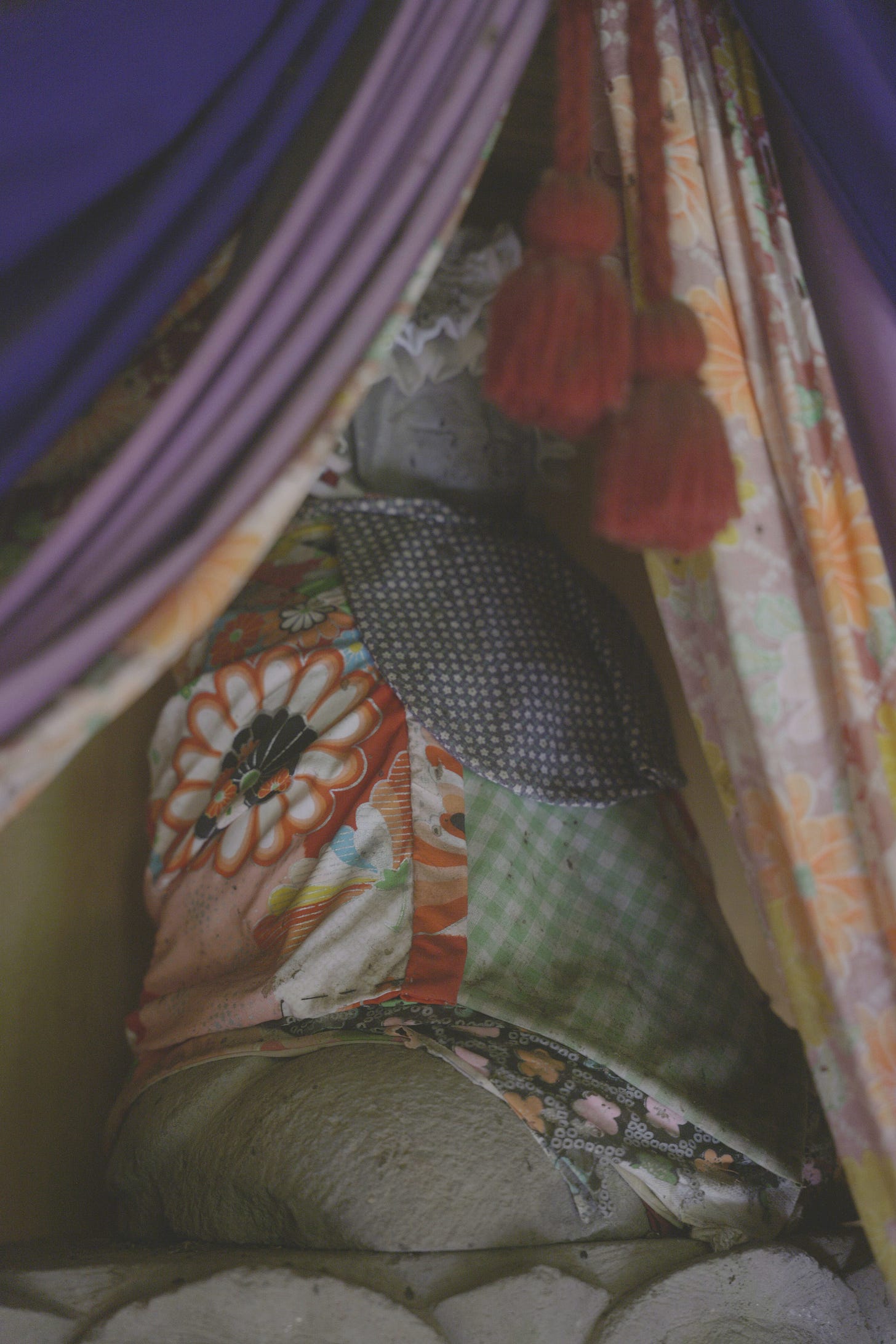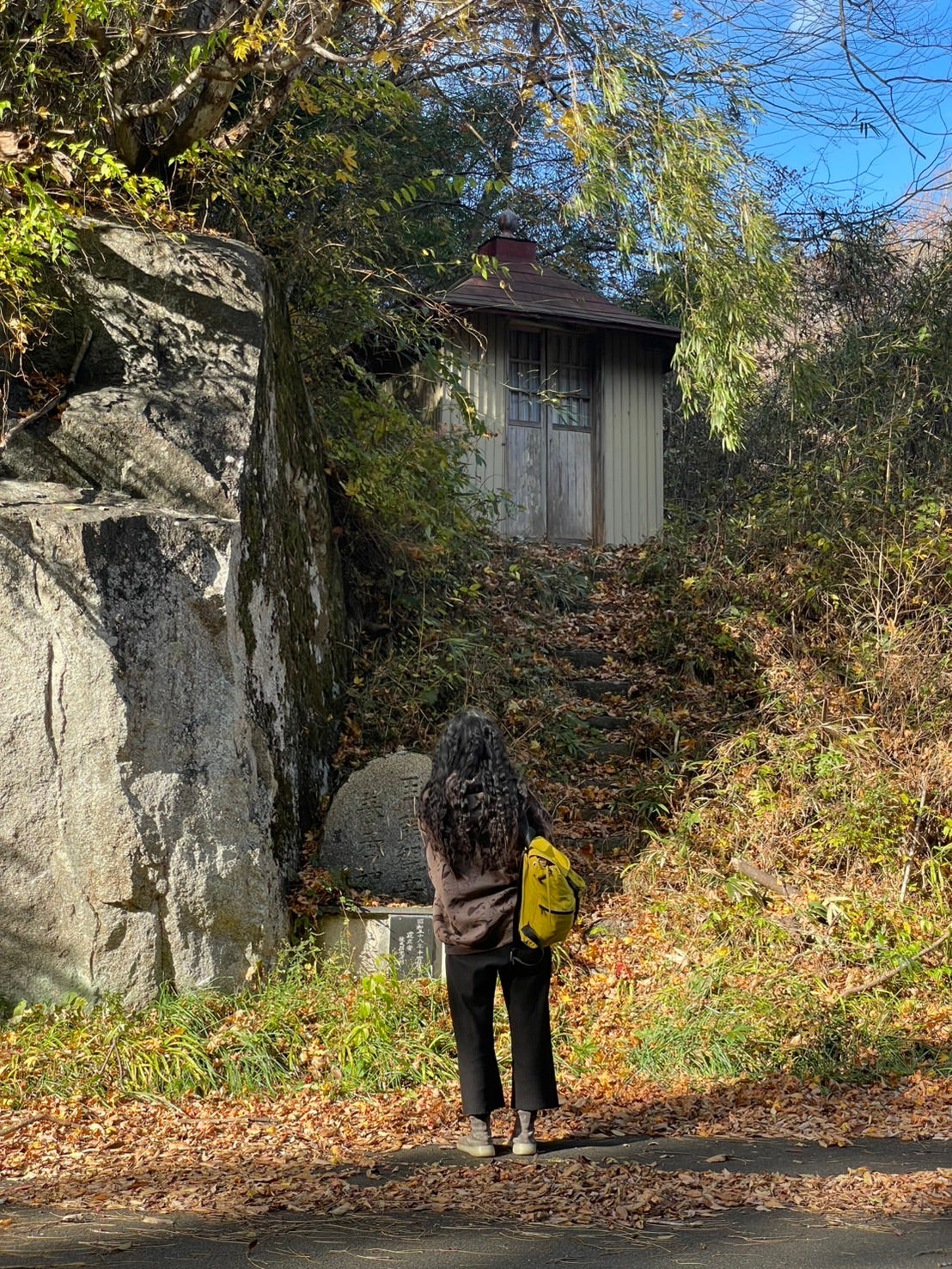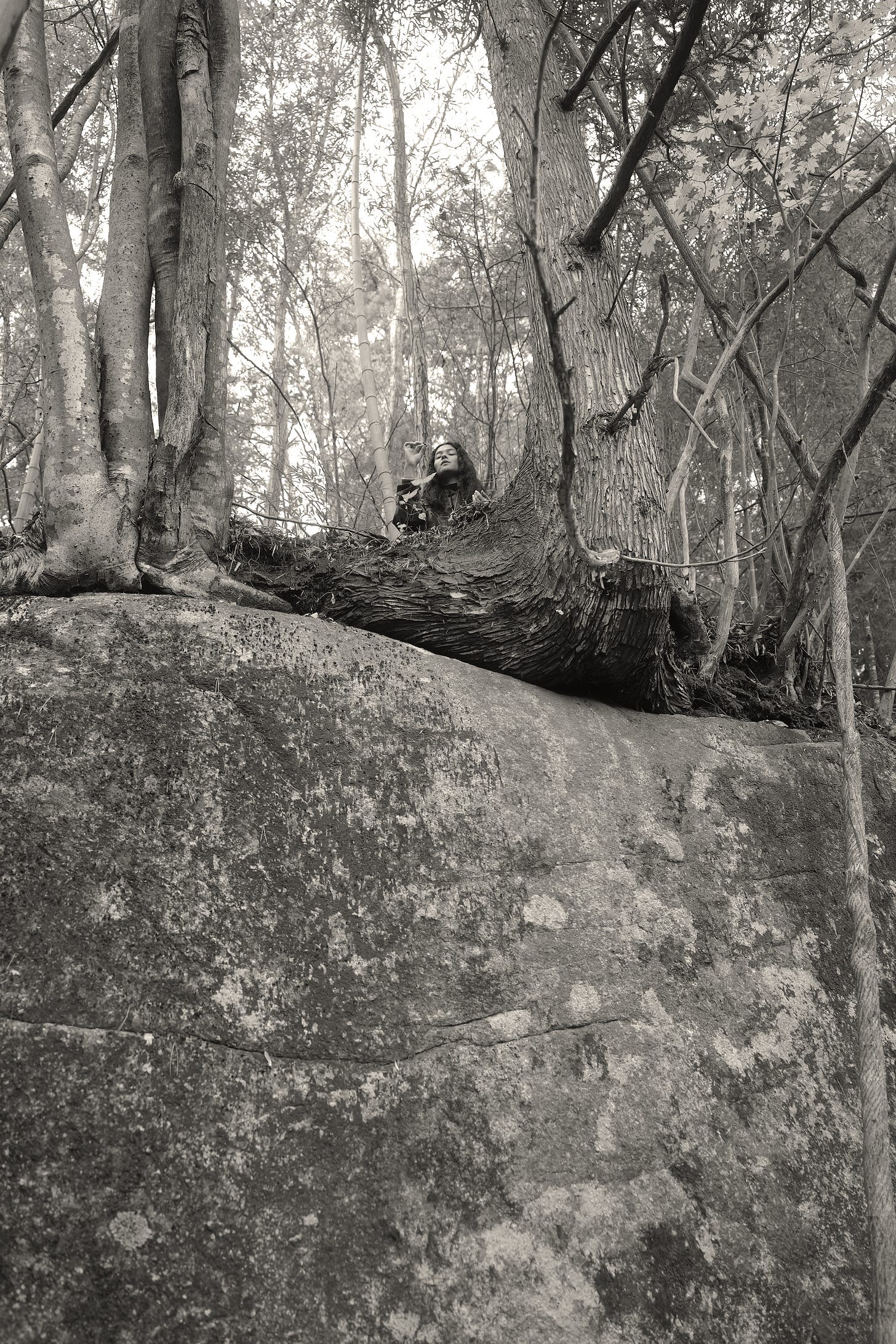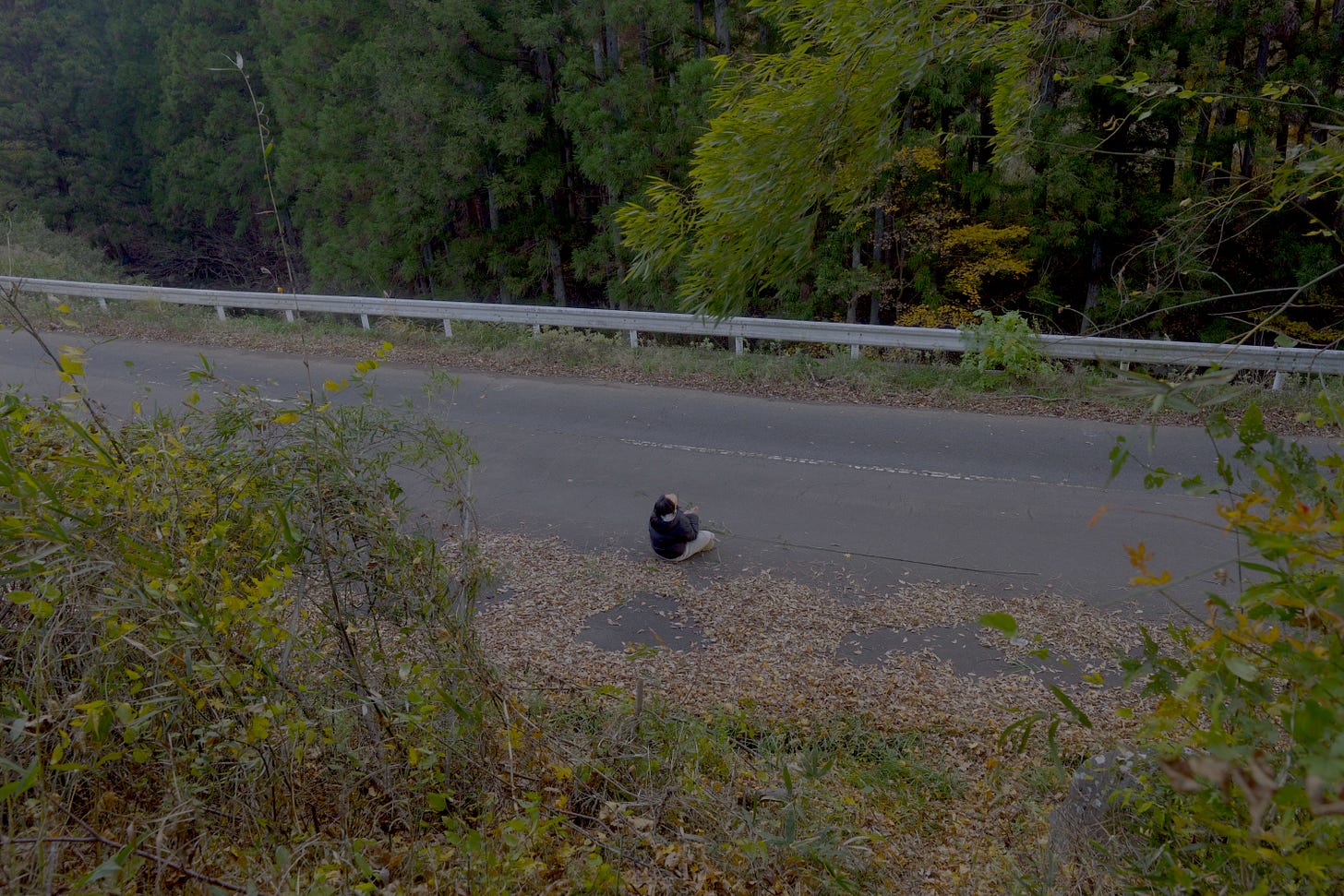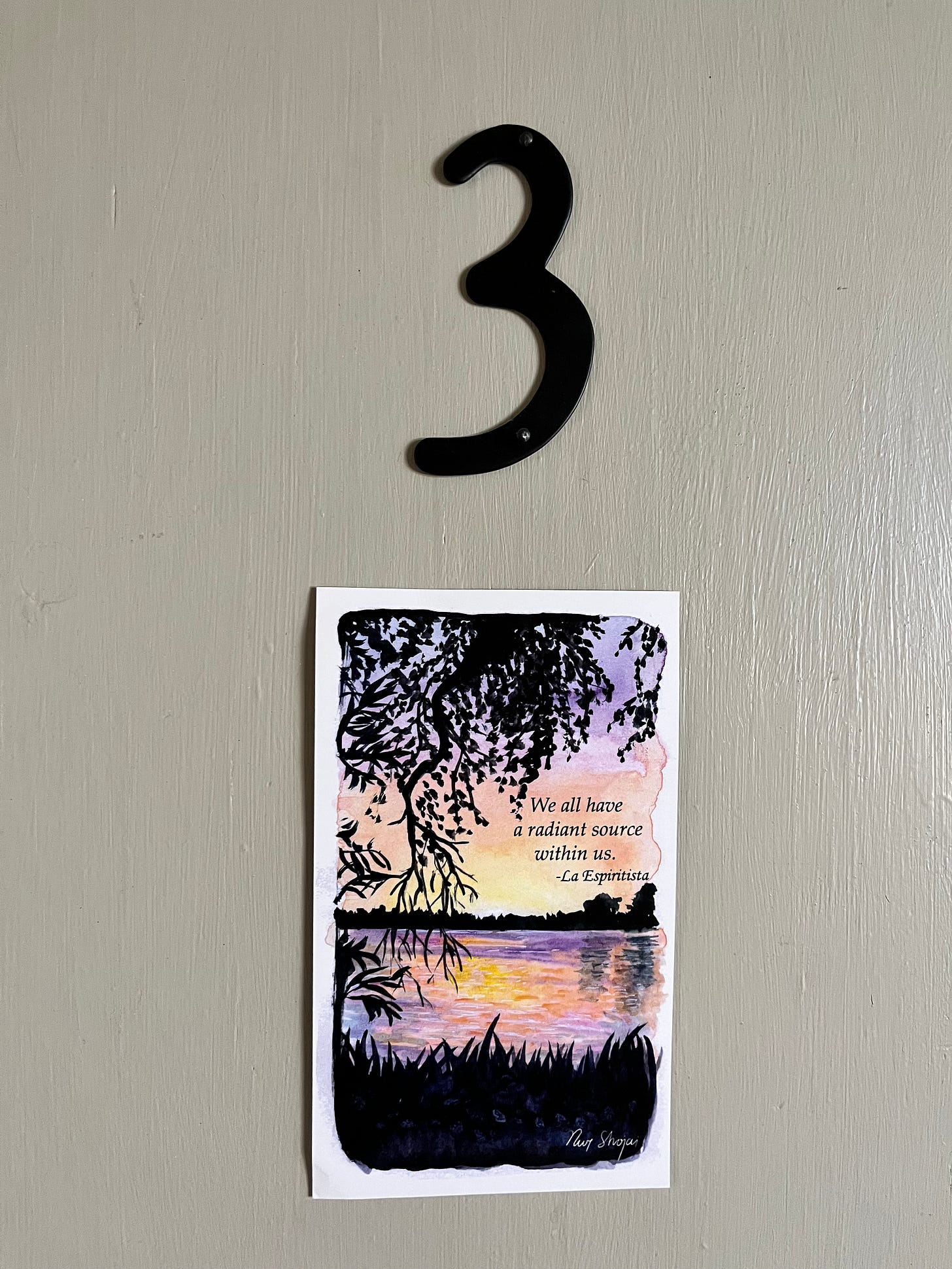the journey to the origin is worth the profound exhausting effort, and we know that when we arrive, we will certainly die.
have you held a prayer between your lips across many seasons? have you summoned a reality without any evidence of its materiality? have you anchored yourself in faith and allowed it to guide the current of your life, refusing doubt and all its messengers?
and have you ever come face to face with your prayer come to reality? and let die the self who prayed for all those seasons. and let die the self who thought that to pray meant to hold tight to knowing. and let die the prayer itself, the one that once billowed out before you like a road of red silk, the one plodded down to arrive at this wall of stone — a dead-end; a gateway.
“… returning to the homeland (which as I mentioned before, is a word I now understand as a falsehood) - I felt a certain unquenchable greed, to consume an authentic version of something, that really ended up leading me into a pit of darkness, rather than a fleshy body. But also, there is of course liberation in this darkness ... a liberation that refuses to let the ego move with the abandon it has become accustomed to…”
-shō yamagushiku
pt i.
for my grandmother’s 88th birthday, i took her up the mountain she had not visited since she was 8 years old. to the place she used to return to with her mother, when her father was drunk and angry. a four hour walk winding up through cedar forest, bamboo grabbing at ankles, seeds planting themselves in the fibers of clothing. my great-grandmother would ask my grandmother to sing songs the whole way to keep the children awake, to keep the children walking.
my great grandmother was born there. my great grandmother was taken from there. accompanied by a horse, as is the custom in the northern mountain regions of occupied ainu mosir, for a young girl to be bound up as a bride and pulled in a horse cart down to the valley. the abukuma valley, where my mother and grandma were born, where the clear waters begin their snaking toward the great ocean, beckoning change.
for years my grandma has resisted my invitation, my plea really, to go back to Hippo with me, always saying the same thing - “what do you want to go there for? there is nothing there, nothing but mountains and rivers.” she who grew up ashamed of her family’s pre-imperial dialect, she who grew up ashamed of calling her own grandmother the word bappayan, a word that is not japanese, not japanese.
i brought us there to the mountain village of Hippo at the southernmost border of miyagi-ken. 400 people live there among the cedars and maples and the winding abukuma River. 12 children live there. not a single pregnant woman lives there.
i did not grow up knowing about this place. i came to know about this place in the last handful of years through persistent questioning, through the refusal of patriarchal record-keeping, and the insistence on the reality of a family history i knew only through oral tradition, dreams and visions.
first vision.
my ancestors in their home in the mountains. their home surrounded by animals. reindeer, wild boars, foxes, raccoons, bears, wolves. a most tender companionship. mountains, water, earth, the hearth of the home. the sweetness of the intimacy with the creatures. i wept and i wept. somehow, in the unspoken current beneath the known human history, i knew there had been a breach of belonging, a stealing away, a loss so immense that my entire soul quilt rattled.
i thought of myself as the changeling turning around, gathering all of time in my skirt, marking the seasons with the ink of my grandmother’s blood, straining my neck to see the mugwort lined with frost, the crater of a distant volcano cradling snow, to hear the pheasant trumpeting leaves down from the maples, sweeping the insects belly up from the floor of the shrine, tracing back histories on the verge of dissipation, arriving with the simplest offering which is our presence on lands that have given us life.
in the months leading up to our pilgrimage to hippo, i would dream of approaching the lush forests of the mountain, only to find myself facing an immoveable wall.
first nightmare.
a series of walls. interlocking and inter-latching. i’m the enemy outside the fortress. i’m on the outside looking in, clawing at the walls. an imprint of banishment, a deep-seeded belief that has shaped the contours of the mind, projecting itself onto the curvatures of earth. i have seen the mountain of green but been unable to touch it. i have put my hands up against the cold glass, frosting it with my breath. how do i come close to you? how do i take you up in my hands?
there is something to be said about the role of prayer in the life and healing of a survivor. the mind recreates prisons of perception, replicating an early experience of inexplicable exile. the mind of a child internalizes and encodes the incomprehensible, the unacknowledged and unspoken harm planted as the seed of sorrow in a bright and fertile mind. the harm becomes the locus around which the child’s mind constructs its impression of reality, permeating all situations, spreading like sickness. the mind coils in on itself, constructing safety through the familiarity of isolation and paranoia. the walls invade all circumstances, seeming to advance across the entire globe of the survivor’s world like an empire’s borders expanding their reach of control and domination. loved ones appear to be enemies, and the earth herself is out of reach, beloved stone contained within a glass sphere, beautiful and distant, untouchable, other. mother.
i remember once asking a mentor, what does it mean when you say “thank you for my life”? i could say the words but i could not access the feeling. what does it mean to feel gratitude for your living? she said you begin with what you know for a fact is true. you begin with the water. you begin with the fire. you begin with the earth. you begin with your breath. you begin with what you know you can touch, you begin with that which keeps you alive, and that which has kept your ancestors alive. that’s where you begin. as many times as you need to. that’s where you begin.
second vision.
the shrine of the horse-headed kami. bato-kannon, the protector of all of the animals within creation. a horse that i am riding. a horse that is following a single dirt road. a horse with hair bristling, rippling. a horse that knows where it is going. my hands on the reigns. a rider who knows where she is guiding. from the valley, up into the mountains. a single dirt road that knows where it leads. a single horse, a single rider. a mind that is focused, determined. a life that knows where it is leading.
the survivor desperate to heal attaches herself to new images, new stories, a sense of purpose, mythologies of ancestry, a notion of destiny. she frightens herself, sometimes, with the single-mindedness of her own conviction. the depth of her need for it all to be true, unequivocally true. she comes to frequent the phrase, “my life depends on it.” she wants freedom from suffering. she believes she has found her pathway to liberation.
i have to write it down. i have to remember. the order doesn’t matter. i just have to write it down. i have to see it spelled out. if i don’t remember then who will? i am fighting against all amnesia. i am traveling now beside an 88 year old woman in the country of her birth and i am so tired, more tired than i have ever been in my entire life. who can help me understand this fatigue, bone deep, like i am lifting the weight of a thousand years?
today i hold the reigns of the horse in my mind clear and direct as the tobacco. holding the reigns of this horse, i am no longer walking in circles, distracted and doubtful. from my grandmother’s mind i summoned the memory like thread. she resisted for so many years but one day she simply remembered that this is also her longing.
today we are returning to the land where her mother was born. she says when we get there, she will surely cry. through the colonial order and rigidity of this nation state, through the quietude and cleanliness, i am rippling in the blood of my ancestors. when she was just a crescent in the sky, i stared at the moon until she became real to me like i could drink her milk and her voice spoke through me like water—i know those northern lands; in my soul, i know those northern lands.
we recount how we are no different from the salmon, pushing against the current with a body-spirit memory that overrides all doubt. the journey to the origin is worth the profound exhausting effort, and we know that when we arrive, we will certainly die.
at some point in time, i would have let the narrative rest here. a story of homecoming, experiencing the long-anticipated embrace of ancestors, finally returning to a place of refuge upon the earth. magical, triumphant, simplistic, predictable.
but illusions don’t last long in the year of the snake.
pt ii.
“One of the sharpest tools for me is the realization that any sort of theory, or praxis, that I inhabit, I must also be willing to give up. I try to hold these ideas, but they are moments, flashes. It’s scary to give things up, to lose things.
When I think about my spiritual practice, I often imagine a table, and every night before I go to bed, I clear off this table, and when I wake up, whatever spirit places on that table is the work that is being asked of me for that day.
Empire at its core is built on control, and so the more I’m able to surrender to what’s being asked of me in the moment, the less beholden I am to certain ideologies and dogmas. But this means I have to give up the security of a flag, of a mark of control.”
-shō yamagushiku
in hippo, i dreamt of holding a green snake in my hands in the bathtub. i submerged the snake in water and they bit me through the flesh of my thigh. i knew i had only a short time to act before the venom set in, calcifying my muscles to stone.
in hippo, an 11 year-old girl named lily-chan appears. she spends the days with us, letting herself in each morning through the doors of her former preschool, now guest house where i stay with my friend and producer kai, and staying through dinner when her grandmother picks her up. she is one of 12 children in the village, as evidenced by the vacant preschool. she takes us up the mountain behind her family’s home and shows us how to bow to each kami that protects her family, represented by moss-covered stones, some almost fully disappeared into the soil and foliage.
lily-chan’s grandparents are the stewards of the shrine of the horse-headed bodhisattva, a place i had visited hundreds of times in my prayers. she brings us to their home, where we are welcomed inside and offered persimmons in all their forms—ripe, overripe, beginning to dry, fully crystallized.
i’ve known from times before that in our region, persimmons are the primary currency of ancestral and kinfolk love and hospitality. lanterns that glow in the trees with the abiding adoration of the ones upon whose lives the sun has already set, glimmering on the mountains throughout the descent into winter, reminding us that through the dimmest and dampest seasons of our lives, we are not alone. the vitality of the sun stored in the roots of trees in summer, fruiting into small gems of encouragement and survival in winter.
i ask lily-chan’s grandfather if it’s strange that i’ve returned to this place, despite my mothers and grandmothers not touching this land for 2 generations, that i’ve returned to bury my unborn child in the form of a drum. lily-chan’s grandfather assures me that it’s not strange. he tells me that for 400 years after they pass, the ancestors’ presence is still known on the lands on which they lived. he tells me that my ancestors are happy that i’m here, that it brings them pleasure.
the familial generosity of the people of hippo is something i hold like a love letter to my chest, a gift that never will lose its newness. when I tell lily-chan’s grandfather that i wish to lay my drum to rest at the shrine of the horse-headed bodhisattva, he makes calls to elementary school classmates, asking everyone if they know of my great-grandmother and where she lived. eventually the chief of the neighborhood where she lived arrives in a tiny truck to bring us to the northern mountain.
when we arrive at the shrine of the horse-headed bodhisattva, we find that the stone is cracked. the chief tells us that two years earlier, the earth rumbled and the stone split in two. he tells us, when a god-stone cracks, the god is no longer in that place.
he takes me to the site of the home of my great-grandmother, where a fire had raged 20 years prior, and new house had been built. he takes me behind the house, and shows me where the mountain spring once ran clear and strong through the childhood home of my great-grandmother, providing the water that nourished my ancestors, the water that made my own life possible, now dry.
first landing.
sun is rising over my homelands, melting the frost. i’ve seen a god-stone cracked in half by earth tremor. i’ve seen a field of hydrophilic golden rod revealing where there once was water. or where water still is, beneath the ground, with no outlet to emerge.
it is morning again and i am trying to pray but i am touching a wall. i am where i’ve dreamt of and though the land and people welcome me as i’d hoped and dreamed, i know that something in me now must die. hippo, i have dreamt of you so many times and now the dream must decompose so that i may look upon you with eyes that open. my eyes open upon you and my mind is shattering. i once left the earth in all my dreaming. i am no longer that dreamer; i am now the one staring at the true story told by the tops of cedar trees, asking what is the true medicine of these lands? how will coming to know them body-to-body change the very nature of my prayers?
i am the one who stands here dissolving, the changeling, the yin snake undone by the earth’s loving tremor, its head disappearing, its tail whipping air, its body becoming fibrous, coiling down.
“I’m most concerned with the feeling of the ground dropping out beneath me, where I’m able to give everything up so that something new can come. Here, the unique composition of each wave that crashes on a shoreline comes to mind. And I think the more that we’re able to live like the waves, both with and without form, the less beholden we become to the violence that is so pervasive in the history of nations.”
-shō yamagushiku
truth is stripping and slipping. the snake year incoming, slithering sinews, insisting on nothing at all, insisting on shedding. all i had reached for, all i had grasped for. i know the snake as an interlocutor between dimensions, the one unknowable, weaving between dream and waking realms, binding and unbinding realities.
my mother pillar or yin fate is that of the yin earth snake, and kai tells me that the mother pillar corresponds with the karmic inheritance through the maternal lines - what my mothers were unable to complete or achieve within their lifetimes, becomes my own yin fate. yin earth, the archetype of the earth mother herself, the all-embracing earth who receives all the toxicity we give unto her, folds it down into her dark dampness, decomposing our failures as well as our celebrations. earth snake, the mystic, who learns through the process of shedding and transmutation, earth snake who can touch all things across all dimensions, gently and persistently.
yin snake, like candlelight, the holder of evocation, of prayer, who moves without sight, who embodies stillness but pierces through the dark quiet when it is time.
i know very little, but i know too much to ignore the earth’s omens. i cannot lie for long. i have seen a god-stone cracked. i have seen a freshwater spring stopped from springing forth, a lineage redirected, the outlet disconnected from the source. strange wonders are at work, speaking a language that cannot be heard beneath stories with a clear narrative arc narrated in official languages of conquest, english or japanese. the ground itself is speaking, in tremors, in shards.
here in this 12-child village, here in this no-more-preschool country, here in this land of no babies, the shrine i trotted towards over the long-winding course of two years, the shrine of the horse-headed bodhisattva on the same north-facing mountain of my great-grandmother’s birth, turned out to be a fertility shrine. i peered inside and saw the baby jizo with stone head in bonnet and handmade clothing by a woman who loves. the chief tells me this is where women come when they are pregnant, trying to conceive, or struggling with fertility. they come to the shrine of koyasu kannon, childbearing bodhisattva, who cohabitates here with the bodhisattva marked with the head of a horse, among others. carved into one of the stones in the cedar forest surrounding the shrine is a baby footprint, chiseled by hand by ancient people.
the chief says nobody comes to this shrine anymore, because no one has pregnancies to protect or pray for. which came first? the cracked god stone or the trouble with fertility? the export of mountain women or their homes engulfed in flames? the divergence of springs or the forgetting of the names of gods, or grandmothers, or villages, or mountains?
i am traveling now beside an 88 year-old woman in the country of her birth and i am so tired, more tired than i have ever been in my entire life. who can help me understand this fatigue, bone deep, like i am lifting the weight of a thousand years?
it’s a strange time for a journey, isn’t it? under the waning light, as the suns sets across the northern hemisphere. it’s a strange time to pursue origin, isn’t it? when the heart is already scorched with thirteen months of genocide and 500 years of genocide and thousands of years of genocide and the knowledge of toxicity leeching into every stretch of sand and soil, including this psyche, hungry for home and clawing at a deserted mountaintop and untended shrines for wholeness.
Because of the atrocities of Japanese and US colonization, there exists a collective desire to catapult ourselves backwards to an origin story where things are clear, where we can say this is our language, this is our people, this is our cuisine…we’re caught in a fantasy of trying to root ourselves in a narrative of a false, pristine past…And so, in an attempt to decolonize, we root our origins in an often singular and often glorified story of the Ryukyu Kingdom. But, in fact, origin stories are always everywhere, and are always all at once. Creation never ceases, our atoms always vibrate—this is creation, it is a force that never leaves us, even and perhaps most importantly in moments of atrocity.
-shō yamagushiku
kai, whose name my grandma says means the armor surrounding an honored warrior, divines for me using the i ching:
gua 63—after the ending. a completion gua.
though i didn’t before, i now know what ending i am approaching from both sides. as i begin my descent down the mountain, i find that there is unfolding within my heart a necessary demise of those anchors i had put in place to save my very life. experiencing the world as a series of walls, i learned to gaze above the horizon line and fix myself to a belonging that could never be challenged, in the cradle of distant mountains and nonhuman kin, in the dreamlike space between the milky way and earth’s rivers.
it’s not untrue, but carries the unmistakeable scent of fantasy. the imagining of a perfect belonging somewhere beyond, somewhere behind, if i just keep walking with my eyes fixed on the horizon — as a way to survive what has felt like a ceaseless and inescapable sorrow — a sense of being unloved and unchosen by my own kind, a sense that has lived with me since the age of 5, when i found myself on the other side of the wall of my mother’s awareness, and experienced the first soul loss.
surely i am not alone in this - surely our collective can understand the power of generational accumulation of unaddressed harm, the power of our mechanisms of distraction from and avoidance of the pain and its sources—the firmness of our beliefs, attachments, identities, and stories. taking different form and shapes across the generations, but caught nonetheless within the looping cycle of this spinning wheel, always thinking we are moving toward greater freedom and happiness, but actually locking ourselves out of our own belonging within the mystery.
first nightmare’s antidote.
i see the edges of the walled fortress. i see the fortress floating in space. the fortress is no longer the all-pervading universe, but a moment in time, a passing thought-form, an imprint of a childhood wound. a choice point reveals itself.
in hippo, i met a wall and looked up. it was just how i’d seen it in my dreams. this time, a loved one reminds me not to try to tear it down. just meet the wall, Cakes tells me. place your hand up against the stone. know the stone itself as an elder, a grandmother, grandfather, as the oldest living ancestor. i saw in my mind’s eye the vibrato of the drum or the gong, rippling through stone. i remembered this had been my prayer alone - to bring my drum to this place, and to offer our song, before placing them in the ground like a seed for a renewed relationship with this life.
in the village of hippo, i embraced the wall and found it dissolving. i walked through its passages, each gateway presenting a new challenge, each challenge a confrontation to my ego, each breath melting the ego to slush, slush to water, water to air. with acceptance came dissolution of the solid, sublimation of the liquid. with embrace came an opening. there is no where to go that is more important than meeting this wall right here. in the village of hippo, i opened to the wisdom of stone.
when i arrived, i laid down every tool and weapon. i was nothing but a lump of clay, vulnerable to weather, loosened from form. it’s from this state that i write this reflection, at the time when dragon gives way to snake, adrift between dimensions, tired from traveling, taking a long silence, coiling down into the cool earth, beginning once again the work of liberation—the work of cultivating refuge at the center of our own being.
“Instead of finding a permanent safety within a specific identity, I realized I am actually working to reject the premise that creates those identities in the first place. To me, these identities are traps, sometimes beautiful ones, that temporarily hold something that ultimately can’t be held. I’m trying to figure out how to use those traps in a way that works towards liberation rather than holding me further entrenched in the violence that I’ve inherited, violence that I have become an active conduit for as a living vessel who descends into being on this plane. And so, I feel like even the most alluring identities have come to fail me, and similarly I fail them. Failure is often looked at as an overwhelmingly negative thing, but I think that there’s actually a lot of freedom within the ways that we fail. Creation is failure.”
-shō yamagushiku
i let the snake wear me down, i trust in the fallow
Through all the shedding, some things remain true.
i surrender all striving to become again the no-self
May those truths sprout up through the ashes of burned illusions.
sitting in silence, i am no body at all, no body special
May they rise up and blanket the ground.
i am the ground itself, with small buds sprouting
May they people the new earth.
All quotes by Shō Yamagushiku come from “On Failure, Silence and the Kingdom: Interview of Shō Yamagushiku” with Wesley I. Ueunten which can be accessed here . Much gratitude to Shō for the permission to include these excerpts within this piece. You can deepen with Shō’s work here .


